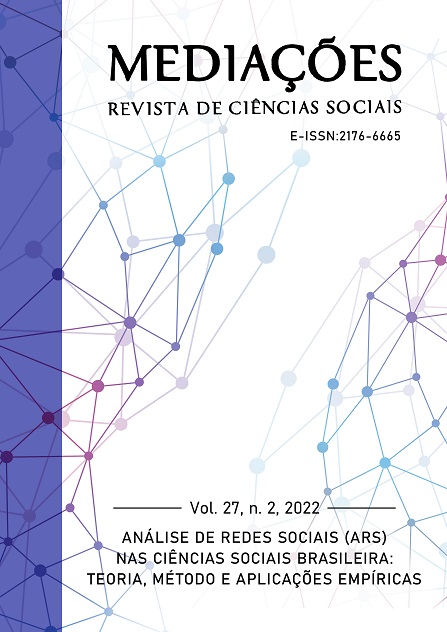Capitalismo de vigilancia en una era de racionalidad neoliberal
DOI:
https://doi.org/10.5433/2176-6665.2022v27n2e45698Palabras clave:
vigilancia, capitalismo, neoliberalismo, racionalidad, capital humanoResumen
El concepto de Capitalismo de Vigilancia revela la lógica de acumulación capitalista de las grandes corporaciones digitales basadas en el seguimiento de los usuarios de Internet, la extracción de datos personales y el cambio de comportamiento. El propósito de este artículo es cuestionar el concepto desde una perspectiva que considera la participación de los internautas en la vigilancia misma. El nuevo enfoque que se propone resulta de una concepción del neoliberalismo como la racionalidad del capitalismo contemporáneo que exige un nuevo orden subjetivo anclado en la producción de una sociedad formada por individuos-empresas involucrados ininterrumpidamente en el desarrollo de sus capitales humanos para la competencia en las relaciones sociales en todos los ámbitos. esferas de existencia. Por lo tanto, la vigilancia en línea realizada por grandes corporaciones y la expropiación de la experiencia humana que conlleva, es solo una parte de la historia. La otra parte es la eterna búsqueda del desempeño individual en las relaciones de los individuos con los demás y consigo mismos.
Descargas
Citas
BALL, Kirstie. Exposure: Exploring the Subject of Surveillance. Information, Communication & Society, London, v. 12, n. 5, p. 639-657, 2009. Available at: https://www.tandfonline.com/doi/pdf/10.1080/13691180802270386?needAccess=true. Accessed at: jun. 13, 2022. DOI: https://doi.org/10.1080/13691180802270386
BAUMAN, Zygmunt; LYON, David. Liquid surveillance. Cambridge: Polity, 2013.
BROWN, Wendy. In the ruins of neoliberalism: the rise of antidemocratic politics in the west. New York: Columbia University Press, 2019. DOI: https://doi.org/10.7312/brow19384
BROWN, Wendy. Undoing the demos: neoliberalism’s stealth revolution. New York: Zone books, 2015. (Near Futures Series). DOI: https://doi.org/10.2307/j.ctt17kk9p8
DARDOT, Pierre; LAVAL, Christian. Common: on revolution in the 21st century. London: Bloomsbury Academic, 2019.
DARDOT, Pierre; LAVAL, Christian. The new way of the world: on neoliberal society. Translated by Gregory Elliott. London: Verso, 2014.
DELEUZE, Gilles. Negotiations 1972-1990. Translated by Martin Joughin. New York: Columbia University Press, 1997.
D'URBINO, Kuca. Big tech’s covid-19 opportunity. The Economist, London, apr. 4, 2020. Available at: https://www.economist.com/leaders/2020/04/04/big-techs-covid-19-opportunity. Accessed at: 13 jun. 2022.
FOUCAULT, Michel. Discipline and punish: the birth of the prison. New York: Pantheon Books, 1977.
FOUCAULT, Michel. History of sexuality. New York: Pantheon Books, 1978. v. 1: an introduction. Available at: https://suplaney.files.wordpress.com/2010/09/foucault-the-history-of-sexuality-volume-1.pdf. Accessed at: jun. 13, 2022.
FOUCAULT, Michel. Security, Territory, population. New York: Picador, 2009. v. 6: Michel Foucault Lectures at the Collège de France 1977-1978.
FOUCAULT, Michel. Society must be defended. New York: Picador, 2003. v. 5: Michel Foucault Lectures at the Collège de France 1977-1978.
FOUCAULT, Michel. The birth of biopolitics. New York: Picador, 2010. v. 7: Michel Foucault Lectures at the Collège de France 1977-1978.
HAGGERTY, Kevin D. Tear down the Walls: on demolishing the panopticon. In: LYON, David (org.). Theorizing Surveillance: the panopticon and beyond. London: Willan Publishing, 2006. p. 23.
HARCOURT, Bernard E. Exposed: desire and disobedience in the digital age. Cambridge: Harvard University Press, 2015. DOI: https://doi.org/10.4159/9780674915077
HARVEY, David. A brief history of neoliberalism. Oxford: Oxford University Press, 2007.
HARVEY, David. The enigma of capital and the crises of capitalism. London: Profile Books, 2011.
KLEIN, Naomi. The shock doctrine: the rise of disaster capitalism. New York: Picador, 2008. DOI: https://doi.org/10.1177/194277860800100215
LUXEMBURG, Rosa. The accumulation of capital. Translated by Agnes Schwarzschild. Eastford: Martino Fine Books, 2015.
LYON, David. Surveillance Culture: Engagement, Exposure, and Ethics in Digital Modernity. International Journal of Communication, Los Angeles, v. 11, n. 1, p. 824-842, 2017. Available at: https://ijoc.org/index.php/ijoc/article/viewFile/5527/1933. Accessed at: jun. 13, 2022.
LYON, David. The culture of surveillance: watching as a way of life. Cambridge: Polity Press, 2018.
MANOKHA, Ivan. Surveillance, panopticism, and self-discipline in the Digital Age. Surveillance and Society, Chapel Hill, v. 16, n. 2, p. 219-237, 2018. Available at: https://ojs.library.queensu.ca/index.php/surveillance-and-society/article/view/8346/7674. Accessed at: 13 jun. 2022. DOI: https://doi.org/10.24908/ss.v16i2.8346
MARWICK, Alice E.; BOYD, Danah. I Tweet Honestly, I Tweet Passionately: twitter users, context collapse and the imagined audience. New Media & Society, Thousand Oaks, v. 13, n. 1, p. 114-133, 2010. Available at: https://journals.sagepub.com/doi/pdf/10.1177/1461444810365313. Accessed at: 13 jun. 2022. DOI: https://doi.org/10.1177/1461444810365313
MARX, Karl. Capital: A Critique of Political Economy. Overland Park: Digi Reads, 2017. v 1.
POLANYI, Karl. The Great Transformation: the political and economic origins of our time. Boston: Beacon Press, 2001. Available at: https://inctpped.ie.ufrj.br/spiderweb/pdf_4/Great_Transformation.pdf. Accessed at: 13 jun. 2022.
ZUBOFF, Soshana. Big other: surveillance capitalism and the prospects of an information civilization. Journal of Information Technology, London, v. 30, p. 75-89, 2015. Available at: https://journals.sagepub.com/doi/pdf/10.1057/jit.2015.5. Accessed at: 13 jun. 2022. DOI: https://doi.org/10.1057/jit.2015.5
ZUBOFF, Soshana. The Age of Surveillance Capitalism: the fight for a human future at the new frontier of power. New York: Public Affairs, 2019.
Descargas
Publicado
Cómo citar
Número
Sección
Licencia
Derechos de autor 2022 Iafet Leonardi Bricalli

Esta obra está bajo una licencia internacional Creative Commons Atribución 4.0.
Los derechos de autor de los artículos publicados en Mediations son del autor; En caso de republicación parcial o total de la primera publicación, se solicita a los autores que indiquen la publicación original en la revista.
Mediações utiliza la licencia Creative Commons Attribution 4.0 International, que proporciona acceso abierto, permitiendo a cualquier usuario leer, descargar, copiar y difundir su contenido, siempre que esté debidamente referenciado.
Las opiniones emitidas por los autores de los artículos son de su exclusiva responsabilidad.
































